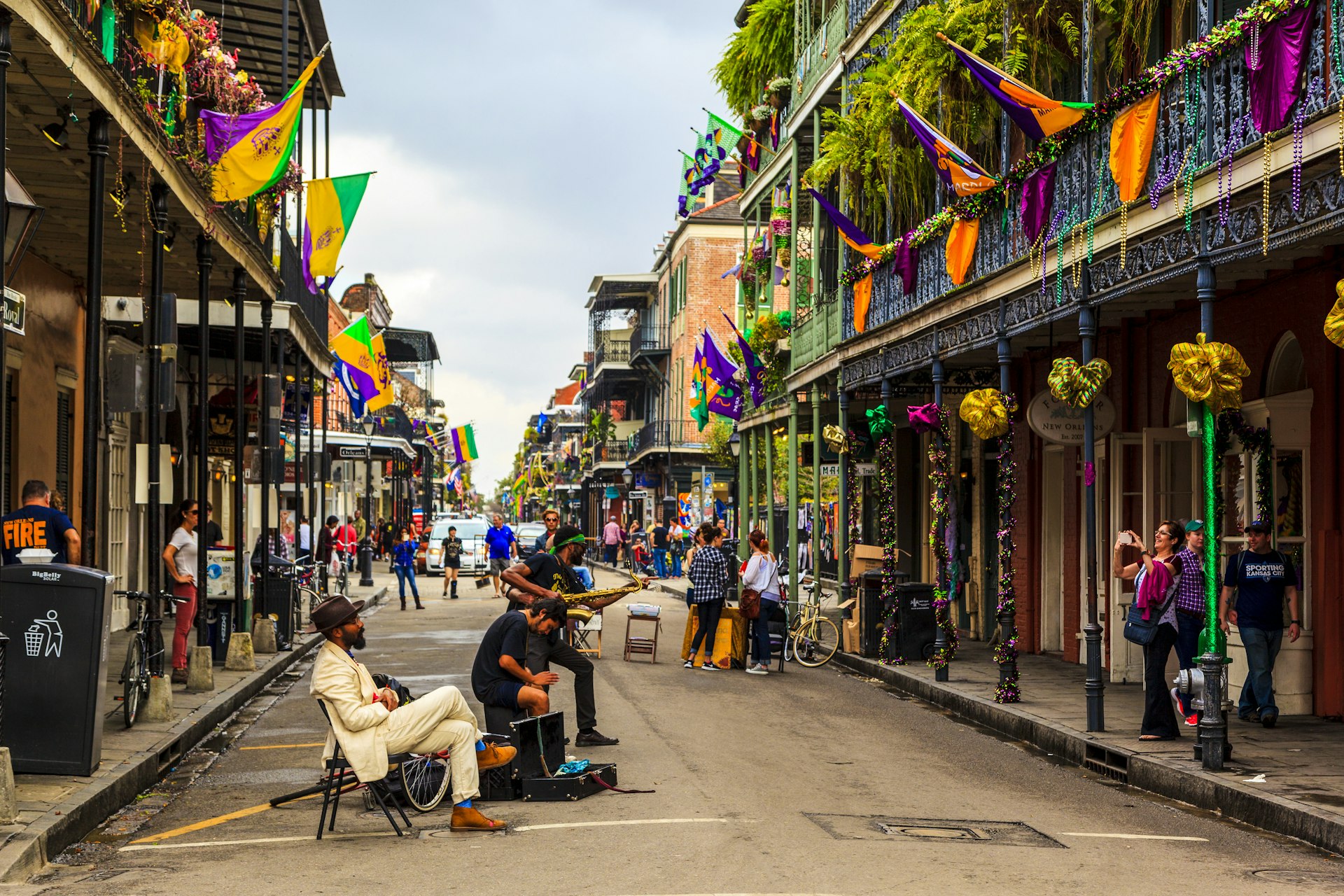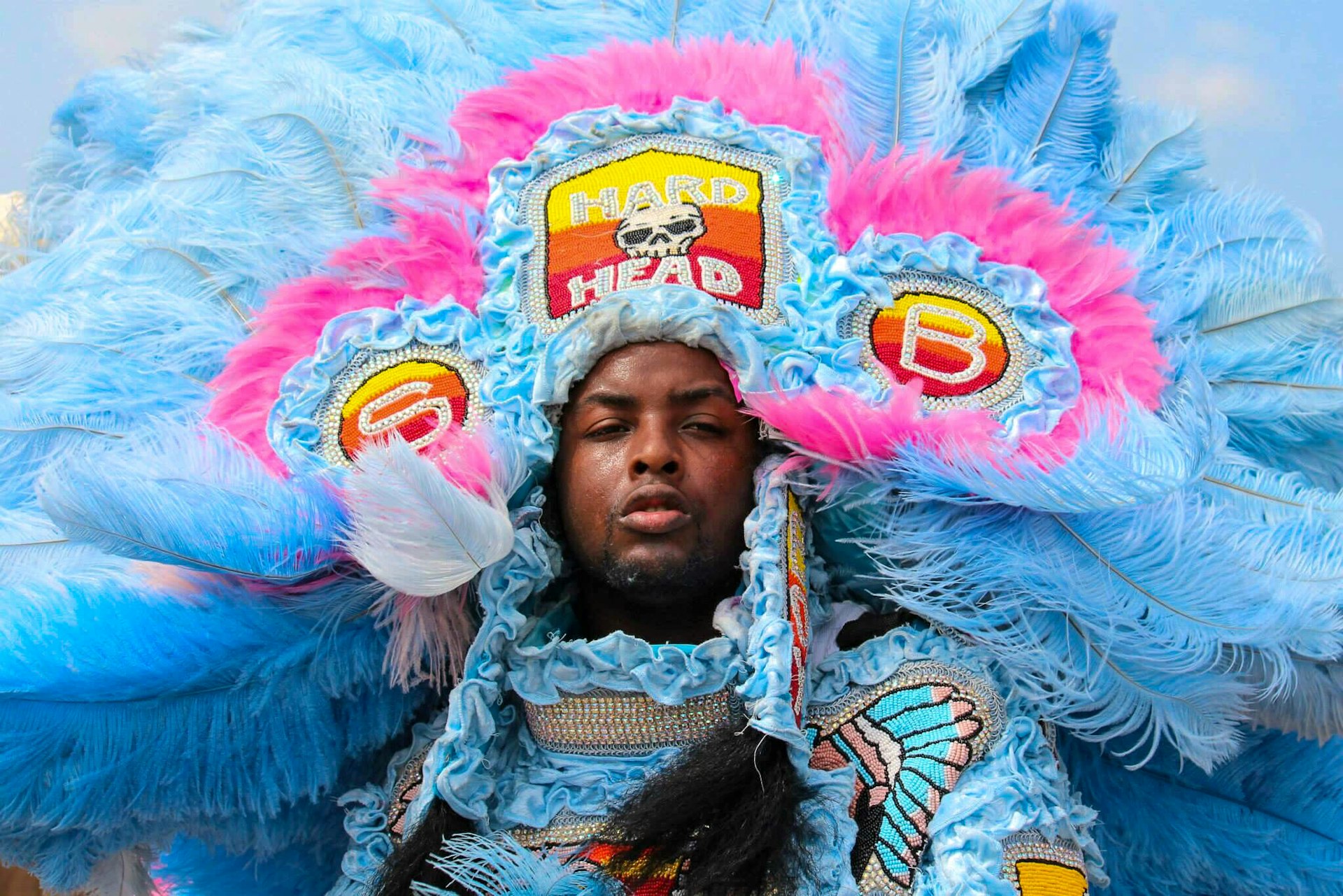The band struck up “Knock With Me, Rock With Me,” by the Lil’ Rascals Brass Band. Or maybe it was “Feel Like Funkin’ It Up” by Rebirth. Or just a cover of “Can’t Take My Eyes Off Of You.” I dunno – any of those songs could be played on any corner, in any second line, here in New Orleans, any time of year.
No, wait, I take that back. Not any time of year. Second lines don’t happen during the summer, at least not on a regular basis, because from June to August the city of New Orleans broils like a steak in a sweaty oven. Plus, second lines didn’t happen during the pandemic. When they came back, it was like recalling a part of the city, a part of our ourselves, and certainly, a big part of the reason we live in this humid, sweltering, subtropical, hurricane-prone floodbowl. It’s the music, and the way it refuses to be constrained to any one venue, street or neighborhood. This is music that demands dance and volume, and it must move, and I must move with it.
Second line etiquette: things to know before you go
So, just what is ‘it’? The second line is, in the simplest terms, an informal New Orleans neighborhood parade. Despite the disclaimers from above, they really can kick off at any time – people will hire a brass band to play for, say, a spouse’s birthday, and when neighbors fall in behind the band as it moves through the streets, that’s a second line (the band itself is the first line).
These are the simplest, most informal versions of the second line, but there are also ‘official’ second lines tied to the city’s Social Aid & Pleasure Clubs (SAPCs). SAPCs are distinctive New Orleans institutions – a combination of a friendship group and an insurance club formed by African Americans, originally aimed at (and still largely situated within) the local Black community. Each SAPC hosts its own second line, and every weekend outside of summer, an SAPC-sponsored parade hits the streets and rolls through predominantly African American neighborhoods.
Anyone can show up. And there is no dress code, although the members of the SAPC make every effort to look as pretty as possible. Just bring walking shoes, and some water, although if you want something stronger to drink, that’s always an option…
Where can you find a second line?
Second lines are an organic sort of celebration – while larger parades warrant street permits and planning, others kick off with little to no warning. If you’re staying in the French Quarter or Central Business District, you may well spot a brass band leading what we’d call ‘corporate second lines’ – bands are hired to play for the many conferences that are held in New Orleans, followed by an inevitably confused pack of business people roped into an often wooden procession. On the other hand, in the same neighborhoods, you may spot a band, a bride, a groom, and a second line followed by the wedding party – a celebration that’s a much more representative version of the ‘real’ thing.
The second lines put on by Social Aid & Pleasure Clubs are the easiest to find, by dint of their being listed on the Takin’ It To The Streets section of the webpage for WWOZ, the city’s most iconic radio station. You’ll find exact details of not only where the parade starts, but the entire marching route (which can last well over a mile).
Show up on time – second lines aren’t always punctual, but you don’t want to miss the start, and a street party always congregates before the main event in any case. Folks grill meat and sell drinks while clustered around a house or bar where the sponsoring Social Aid & Pleasure Club members don suits, often accented with intricate bead or feather work, a nod to the Mardi Gras Indians, another component of the city’s African American ‘backstreet’ culture.
When the time is right, the band kicks off and the members of the SAPC emerge onto the street, dancing and shuffling to the front of the procession as a crowd falls in behind them. The second line then follows a predetermined route, attracting followers along the way – an initial parade of a few hundred can easily swell to a thousand, or many more (fair warning: second lines are not fun if large crowds aren’t your thing), You’re absolutely welcome to march with the crowd – it’s expected! Staying near the band is a good way of pumping the city’s music directly into your veins.
The parade makes stops at well-known bars, where participants dance, load up on drinks, or just slip away – you don’t have to follow a second line for its entire length to feel like you’ve experienced it. SAPC second lines take place in the city’s Black residential areas and are loosely divided into Uptown and Downtown parades, with Canal St serving as the line of delineation. There’s no one second line route, but many linger under the elevated highway that shadows Claiborne Avenue. Claiborne was once a main street for Black New Orleans, a commercial artery that was devastated when the I-10 highway was built over it. Black New Orleanians still claim the street for parades, both as a show of maintaining their historical presence on a thoroughfare that was wrecked by discriminatory urban planning, and for practical, sonic reasons – the acoustics under the highway make for an auditory experience that grabs listeners right in the guts.
Parade routes and transport options
Check WWOZ to figure out where the parade starts and consider getting a taxi there. A cab or ride service will probably have to drop you off at the edge of the second line pregame party, but better to walk a few blocks than look for street parking, which can be scarce depending on the neighborhood. Plus, if you end up leaving the parade early, you don’t have to hoof it back to your vehicle.
That said, SAPC second lines often make a loop, so if you stick with the parade you might end up back where you started – again, check the route map on the WWOZ website to confirm this. Biking to a second line eliminates the need for parking, but you’ll still have to walk back to your bicycle, as pushing a bike along with the crowd feels intrusive.

Keep the party going
The average second line can last for well over a mile, or far more. By the time you reach the end, you will have gotten some steps in, and possibly, some whiskey or beer from the hustling entrepreneurs who always follow the parade with a cooler. The point is, plenty of people feel too wiped to carry on when the parade dissipates.
If you leave the parade early, or just have superhuman stamina, keep in mind that second lines usually move through residential areas. If you need to peel off to sit at a bar or grab something to eat, there are often many businesses in the vicinity where you can scratch that itch, because, y’know, New Orleans.

Take it home
There aren’t dedicated second line souvenirs to collect, so the main takeaway that you can bring home is a memory. If you decide to take photos, be respectful – folks here understand that visitors want to take pictures, but if you position yourself in a way that hinders the band or the parade leaders in the Social Aid & Pleasure Club, locals will justifiably seem annoyed.
Otherwise, the main thing you can take from a second line is the satisfaction of burning calories while witnessing a unique cultural practice that has its roots in the Caribbean, yet partially defines a North American city.
How to prepare
Build that cardio – for real, dancing and moving through the streets of the city can easily wear you out. Bring water, as the city is still plenty hot in most of spring and fall. Wear some comfortable shoes, and keep some cash to spend on local food and libations. Mainly, keep up on the location of a parade via WWOZ – this is your ticket to actually finding the party.
Be warned, if you bring kids the music can be loud and the walking length can be hard on little ones. Otherwise, have an open mind, respect parade etiquette (i.e. don’t block the band), and enjoy the show – while the rest of the USA spends Sunday running errands, down here, we’re trying to push the beat across the whole (or at least, a sizable chunk of) the city.
